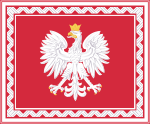Donald Tusk
Donald Franciszek Tusk (/tʊsk/; Polish: [ˈdɔnalt franˈt͡ɕiʂɛk ˈtusk] (![]()
His Excellency Donald Tusk | |
|---|---|
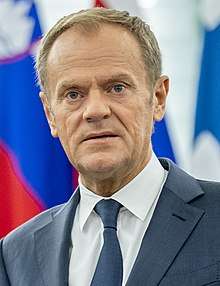 Tusk in 2019 | |
| President of the European People's Party | |
| Assumed office 1 December 2019 | |
| Secretary-General | Antonio López-Istúriz White |
| Group Leader | Manfred Weber |
| Preceded by | Joseph Daul |
| President of the European Council | |
| In office 1 December 2014 – 30 November 2019 | |
| President of the Commission | Jean-Claude Juncker |
| President of the Parliament | Martin Schulz Antonio Tajani David Sassoli |
| Preceded by | Herman Van Rompuy |
| Succeeded by | Charles Michel |
| 14th Prime Minister of Poland | |
| In office 16 November 2007 – 22 September 2014 | |
| President | Lech Kaczyński Bronisław Komorowski (Acting) Bogdan Borusewicz (Acting) Grzegorz Schetyna (Acting) Bronisław Komorowski |
| Deputy | Waldemar Pawlak Grzegorz Schetyna Janusz Piechociński Jacek Rostowski Elżbieta Bieńkowska |
| Preceded by | Jarosław Kaczyński |
| Succeeded by | Ewa Kopacz |
| Chairman of Civic Platform (PO) | |
| In office 1 June 2003 – 8 November 2014 | |
| Secretary-General | Grzegorz Schetyna Paweł Piskorski Grzegorz Schetyna Andrzej Wyrobiec Paweł Graś |
| Parliamentary Leader | Himself Bogdan Zdrojewski Zbigniew Chlebowski Grzegorz Dolniak (Acting) Grzegorz Schetyna Tomasz Tomczykiewicz Rafał Grupiński |
| Preceded by | Maciej Płażyński |
| Succeeded by | Ewa Kopacz |
| Leader of the Liberal Democratic Congress (KLD) | |
| In office 19 May 1991 – 23 April 1994 | |
| Preceded by | Janusz Lewandowski |
| Succeeded by | Party dissolved Tadeusz Mazowiecki (As Leader of the Freedom Union) |
| Personal details | |
| Born | Donald Franciszek Tusk 22 April 1957 Gdańsk, Poland |
| Political party | Liberal Democratic Congress (before 1994) Freedom Union (1994–2001) Civic Platform (2001–present) |
| Other political affiliations | European People's Party |
| Spouse(s) | Małgorzata Sochacka (m. 1978) |
| Children | 2 |
| Education | University of Gdańsk |
| Awards | |
| Signature | |
| Website | Official website |
Tusk has been involved in Polish politics since the early 1990s, having founded several political parties and held elected office almost continuously since 1991. Tusk was one of the co-founders of the free-market-oriented Liberal Democratic Congress party. He entered the Sejm (lower chamber of Poland's parliament) in 1991, but lost his seat in the 1993 election which went badly for the Congress.
In 1994, the Congress merged with the Democratic Union to form the Freedom Union. In 1997, Tusk was elected to the Senate, and became its deputy speaker. In 2001, he co-founded another centre-right liberal conservative party, Civic Platform (PO), and he was again elected to the Sejm, and became its deputy speaker.[4]
He was elected prime minister in 2007 and with his party's victory in the 2011 Polish parliamentary election, he became the first prime minister to be re-elected since the fall of Communism in Poland.[5] In 2014, he became president of the European Council and was re-elected to this position in 2017. He resigned as Polish prime minister to take the role, having been the longest-serving prime minister of the Third Polish Republic.
Early life
Tusk was born in Gdańsk in northern Poland.[6] He has German (maternal grandmother)[7] and Kashubian[8][9] ancestry. His father, also named Donald Tusk (1930–1972), was a carpenter, and his mother, Ewa (née Dawidowska) Tusk (1934–2009),[10][11] was a nurse.[6] His grandfather, Józef Tusk (1907–1987), was a railway official who was imprisoned at the Neuengamme concentration camp; later, as a former citizen of the Free City of Danzig, he was apparently conscripted by German authorities into the Wehrmacht. Later on, he was successful in joining the Polish Armed Forces in the West.[12]
Tusk has described the city of his youth as "a typical frontier town" with "many borders ... between ethnicities". This, together with his Kashubian ethnic ancestry and multilingual family, meant that he grew up with an awareness that "nothing is simple in life or in history", which informed his adult political view that it is "best to be immune to every kind of orthodoxy, of ideology and most importantly, nationalism". He has described his young life under communism as "so hopeless" due to the boredom and monotony, with "no hope for anything to change". His young self was a "typical hooligan" who often got into fights - "we would roam the streets, you know, cruising for a bruising."[13]
Tusk credits his interest in politics to watching clashes between striking workers and riot police when he was a teenager.[6] He enrolled at the University of Gdańsk to study history, and graduated in 1980.[14] While studying, he was active in the Student Committee of Solidarity, a group that opposed Poland's communist rule at the time.[14]
Early political career
Tusk was one of the founders of the Liberal Democratic Congress (Kongres Liberalno-Demokratyczny KLD), which in the 1991 elections won 37 seats in the lower house of parliament.[14] The KLD later merged with the Democratic Union (UD) to become the Freedom Union (UW).[14] Tusk became deputy chairman of the new party, and was elected to the Senate in the next election in 1997.[14] In 2001, he co-founded the Civic Platform, and became deputy speaker in parliament after the party won seats in the year's election.[6] in 2005, Tusk was defeated in the presidential election by Lech Kaczyński, and the Civic Platform lost Parliament to the Law and Justice party.[6]
Prime Minister of Poland (2007–2014)
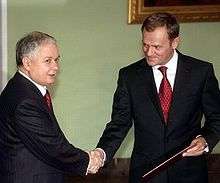
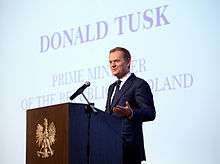
Tusk and his Civic Platform party emerged victorious in the 2007 Polish parliamentary election, defeating incumbent Prime Minister Jarosław Kaczyński's Law and Justice party with about 42% of the vote to Law and Justice's 32%.[15] Tusk and his assembled cabinet were sworn in on 16 November, as he became the fourteenth prime minister of the Third Polish Republic.[16]
In the 2011 Polish parliamentary election, Civic Platform retained their Parliamentary majority, giving Tusk a second term as Prime Minister and making him Poland's first PM to win reelection since the fall of communism.[17] In September 2014, Tusk resigned his position as Prime Minister of Poland in order to take the position of President of the European Council.[18]
Domestic policy
During the 2007 parliamentary election campaign and initially when he entered office, Tusk promised to continue the free market policies, streamline the bureaucracy, enact long-term stable governance, cut taxes to attract greater foreign business ventures, encourage Polish citizens living overseas to return to Poland, and privatise state-owned companies.[19] Later in office, Tusk changed his views on the role of taxation in the functioning of the state and his government never cut any taxes.[20] Instead, it raised VAT from 22% to 23% in 2011,[21] increased the tax imposed on diesel oil, alcohol, tobacco and coal,[22][23] and eliminated many tax exemptions.[24][25][26] The number of people employed in public administration also grew considerably.[27][28] By 2012, the value of foreign investments in Poland had not matched the peak level attained in 2006–07, before Tusk entered office.[29] The number of Poles living abroad in 2013 was almost the same level as in 2007.[30]
The construction of a more adequate and larger national road network in preparation for the UEFA 2012 football championships was a stated priority for Tusk's government.[31] On 27 October 2009, Tusk declared that he wanted to partially ban gambling.[32]
During the 2009 swine flu pandemic, Tusk defended his government's decision not to purchase swine flu vaccine, citing the lack of testing by pharmaceutical companies and its unavailability to be purchased freely through the market. Tusk criticised other nations' responses to the pandemic. "The eagerness of some countries seems to be excessive and disproportionate to the real epidemiological situation," Tusk stated, referring to the pandemic's relatively low fatality rate.[33]
Tusk is moderately conservative on social issues. He is opposed to legalising abortion on demand, believing that current Polish legislation on abortion (which allows for legal abortion only when the pregnancy threatens the woman's life or health, when the foetus is seriously malformed, and when the pregnancy results from rape or incest) protects human life best.[34] Tusk has publicly stated that he opposes euthanasia.[35]
Foreign policy
.jpg)
In foreign policy, Tusk sought to improve relations severely damaged during the previous Kaczyński government, particularly with Germany and Russia. While he criticised the words of German politician Erika Steinbach with regard to her opinion over the expulsion of Germans from Poland following World War II, Tusk has stressed the need for warm relations with Berlin.[36] Tusk also advocated a more realistic relationship with Moscow, especially in regard to energy policy.[36] Under Tusk's premiership, Russian bans on Polish meat and agricultural products were lifted, while Poland reversed its official policy of disagreement on a European Union-Russian partnership agreement.[37]
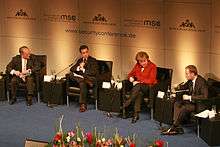
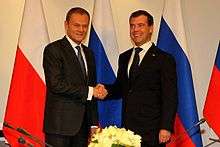
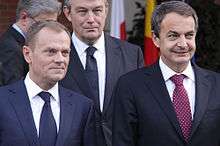
.jpg)
During a speech delivered to the Sejm in the first weeks of his premiership, Tusk outlined a proposal to withdraw military units from Iraq, stating that "we will conduct this operation keeping in mind that our commitment to our ally, the United States, has been lived up to and exceeded."[38] The last Polish military units completed their withdrawal in October 2008.[39]
In regards to U.S. plans of hosting missile defense shield bases in the country, Tusk hinted skepticism toward the project, saying that their presence could potentially increase security risks from Russia, and rejected U.S. offers in early July 2008.[40] By August, however, Tusk relented, and supported the missile shield, declaring: "We have achieved the main goal. It means our countries, Poland and the United States will be more secure."[41] Following President Barack Obama's decision to scrap and revise missile defense strategy, Tusk described the move as "a chance to strengthen Polish-US co-operation in defense..." He said: "I took this declaration from President Obama very seriously and with great satisfaction."[42]
Tusk announced that Polish soldiers would not take military action in Libya, although he voiced support for the 2011 military intervention in Libya and pledged to offer logistical support.[43][44]
Contrary to the condemnation of foreign governments and the leadership of the European Union, Tusk supported Hungarian Prime Minister Viktor Orbán in his efforts of implementing a new controversial constitution. Tusk stated that the Hungarian constitution's democratic controversies were "exaggerated" and that Hungary had "a European level standard of democracy".[45] Tusk's support for the Hungarian government garnered a rare show of solidarity with the opposition Law and Justice, which also publicly displayed support for Orbán's efforts.[46]
In early 2012, Tusk announced his support for committing Poland to signing the international Anti-Counterfeiting Trade Agreement (ACTA). In response, websites for the Chancellery, Sejm and Presidency were hacked in mid-January.[47] Following Anonymous's claim of responsibility for the web attack, Tusk remained undeterred by internet protests, authorising the Polish ambassador in Japan to sign the agreement, yet promised that final legislation in the Sejm would not go ahead without assurances regarding freedom to access the Internet.[48] Despite the government's guarantees, mass protests erupted in late January, with demonstrations held in Warsaw, Kraków, Wrocław and Kielce.[49][50] Further web attacks were reported on the website of Foreign Minister Radek Sikorski.[51]
European policy
In continental policy, Tusk strongly supported greater political and economic integration within the European Union, strongly backing the implementation of the Lisbon Treaty, standing in stark contrast to President Lech Kaczyński's vehement opposition.[52] Tusk repeatedly stated his government's intention in bringing Poland into the Eurozone. Originally wanting to introduce the euro by 2012, Tusk envisaged in 2009 a starting year of 2015 as "a realistic and not overly-ambitious goal".[53] However, during the European sovereign debt crisis, Tusk and his government displayed less optimism in joining the monetary union under contemporary economic circumstances, leading to Finance Minister Jan Vincent-Rostowski calling any move "unthinkable".[54] Despite not being a member of the eurozone, Tusk pressed that Poland, along with the other non-eurozone states of the EU, should be included in future euro financial negotiations.[55]
_(13328160354).jpg)
Between July and December 2011, Poland under Tusk's government presided over the Presidency of the Council of the European Union.[56] Under its presidency tenure, Poland supported and welcomed Croatia's entry into the European Union through the Treaty of Accession 2011.[57]
While being a constituent member of the Weimar Triangle with fellow states Germany and France, Tusk showed displeasure over German Chancellor Angela Merkel's and French President Nicolas Sarkozy's dominating roles in eurozone negotiations, remarking to Italian newspaper Corriere della Sera in January 2012 that "this should not translate into a lasting political monopoly: things cannot be left to only two capitals of Europe."[58]
Constitutional reform
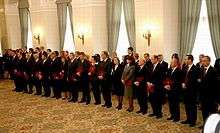
After being elected prime minister, relations between Tusk and President Lech Kaczyński were often acrimonious due to different political ideologies and the constitutional role of the presidency. Using presidential veto powers, Kaczyński blocked legislation drafted by the Tusk government, including pension reform, agricultural and urban zoning plans, and restructuring state television.[59]
In his premiership, Tusk has proposed various reforms to the Polish constitution. In 2009, Tusk proposed changes to the power of the presidency, by abolishing the presidential veto. "The president should not have veto power. People make their decision in elections and then state institutions should not be in conflict," said Tusk.[60] Tusk again reiterated his desire for constitutional reform in February 2010, proposing that the presidential veto be overridden by a simple parliamentary majority rather than through a three-fifths vote. "Presidential veto could not effectively block the will of the majority in parliament, which won elections and formed the government," stated Tusk.[61] Further constitutional reforms proposed by Tusk include reducing the Sejm from a membership of 460 to 300, "not only because of its savings, but also the excessive number of members' causes blurring certain plans and projects".[61] Similarly, Tusk proposed radical changes to the Senate, preferring to abolish the upper house altogether, yet due to constitutional concerns and demands from the junior coalition Polish People's Party partner, Tusk proposed reducing the Senate from 100 to 49, while including former presidents to sit in the Senate for political experience and expertise in state matters.[61] Parliamentary immunity for all members of the Sejm and Senate would also be stripped, except for in special situations.[61] In addition, Tusk proposed that the prime minister's role in foreign policy decisions would be greatly expanded.[62] By decreasing the president's role in governance, executive power would further be concentrated in the prime minister, directly responsible to the cabinet and Sejm, as well as avoiding confusion over Poland's representation at international or EU summits.[63] The opposition conservative Law and Justice party deeply criticised Tusk's constitutional reform proposals, opting in opposing legislation for the presidency to garner greater power over the prime minister.[64]
In an interview with the Financial Times in January 2010, Tusk was asked if he considered running again as Civic Platform's candidate for that year's presidential election. Tusk replied that although the presidential election typically drew the most voters to the polls and remained Poland's most high-profiled race, the presidency had little political power outside of the veto, and preferred to remain as prime minister. While not formally excluding his candidacy, Tusk declared that "I would very much like to continue to work in the government and Civic Platform, because that seems to me to be the key element in ensuring success in the civilisational race in which we are engaged."[65] A day after the interview, Tusk formally announced his intention of staying as prime minister, allowing his party to choose another candidate (and eventual winner), Bronisław Komorowski.[66]
Honors and awards
The Charlemagne Prize of the city of Aachen was awarded to Tusk on 13 May 2010 for his merits in the further unification of Europe and for his role as a "patriot and great European". He dedicated the prize to the people killed in a plane crash of a Polish Air Force Tu-154 in April 2010 including the Polish president Lech Kaczyński. The eulogy was given by German chancellor Angela Merkel.[67]
In May 2012, he received the Walther-Rathenau-Preis "in recognition for his commitment to European integration during Poland's Presidency of the Council of the EU in the second half of 2011 and for fostering Polish-German dialogue". In her speech German chancellor Angela Merkel praised Tusk as "a farsighted European".[68] In December 2017, he was awarded an honorary doctorate at the University of Pécs, Hungary in recognition of Tusk's "achievements as a Polish and European politician, which are strongly connected with Hungarian, regional and European history".[69] On 16 December 2018, Tusk was awarded an honorary doctorate at the TU Dortmund University, Germany "in recognition of his services to European politics and his contribution to the debate on European values".[70] In 2019, he was awarded an honorary doctorate at the University of Lviv, Ukraine, which he accepted on the fifth anniversary of the 2014 Ukrainian revolution.[71]


- Presidential Order of Excellence (Georgia, 2013)[74]


President of the European Council (2014–2019)
.jpg)
Tusk succeeded Herman Van Rompuy as President of the European Council on 1 December 2014.[77]
Since assuming office, Tusk has notably worked to promote a unified European response to Russia's military intervention in Ukraine.[78] Tusk made attempts to co-ordinate the EU's response to the European migrant crisis, and warned illegal economic migrants not to come to Europe.[79][80] Ahead of the UK's EU membership referendum Tusk warned of dire consequences should the UK vote to leave.[81] After the vote he pursued a hard line on the UK's withdrawal from the European Union stating that the country's only real alternative to a "hard Brexit" is "no Brexit".[82] In September 2018 he caused controversy after his official instagram account posted an image of himself handing a slice of cake to British Prime Minister Theresa May, with the caption "A piece of cake, perhaps? Sorry, no cherries."[83][84] Tusk has opposed the Nord Stream 2 gas pipeline from Russia to Germany.[85]
.jpg)
On 31 January 2017, Tusk wrote an open letter to the 27 EU heads of state or government on the future of the EU before the Malta summit.[86] In this letter, he stated the Trump administration presented a threat to the EU on a par with a newly assertive China, an aggressive Russia and "wars, terror and anarchy in the Middle East and Africa".[87]
On 9 March 2017, Tusk was re-elected for a second term to last until 30 November 2019.[88] He received 27 of 28 votes; the one vote against him came from Beata Szydło, the Prime Minister of Poland.[89] Tusk's actions in the wake of the 2010 plane crash that killed then-Polish President Lech Kaczyński provoked opposition from Poland's governing right-wing party—critics said that Tusk's centrist government did not sufficiently investigate the cause of the crash.[88][90] Szydło refused to sign the EU statement issued at the end of the Council's meeting in protest at Tusk's reelection, though other EU leaders spoke in favor of him; Prime Minister Mark Rutte of the Netherlands called him "a very good president",[90] and European Commission President Jean-Claude Juncker and German chancellor Angela Merkel both made statements supporting the vote.[88]
Donald Tusk maintains there will be no winners from Brexit and the two years following the triggering of Article 50 will be a time of damage limitation.[91]
In February 2018, Tusk urged Turkey "to avoid threats or actions against any EU member and instead commit to good neighbourly relations, peaceful dispute settlement and respect for territorial sovereignty."[92] Tusk also expressed concern over the Turkish invasion of northern Syria in 2018.[93] In response to the death of Chinese Nobel Peace Prize laureate Liu Xiaobo, who died of organ failure while in government custody, Tusk and Jean-Claude Juncker said in a joint statement that they had learned of Liu's death "with deep sadness".[94]
.jpg)
On 6 February 2019, Tusk held talks with Irish Premier Leo Varadkar in Brussels to discuss Britain's departure from the European Union, stating that there was a "special place in hell for those who promoted Brexit without even a sketch of a plan how to carry it out safely".[95][96] Tusk opened his statement by saying there were 50 days to go until the UK's exit from the EU: "I know that still a very great number of people in the UK, and on the continent, as well as in Ireland, wish for a reversal of this decision. I have always been with you, with all my heart. But the facts are unmistakable. At the moment, the pro-Brexit stance of the UK Prime Minister, and the Leader of the Opposition, rules out this question. Today, there is no political force and no effective leadership for Remain. I say this without satisfaction, but you can't argue with the facts."[95]
On 24 August 2019 in Biarritz for the G7 Summit, Tusk addressed reporters regarding Brexit, stating "one thing I will not cooperate on is no deal." He also said he hoped that Boris Johnson would not go down in history as 'Mr No Deal'.[97][98] In September 2019, Tusk said that the EU should open accession talks with both Albania and North Macedonia.[99]
Tusk condemned the 2019 Turkish offensive into north-eastern Syria. He reprimanded Turkish President Tayyip Erdogan for threatening to send millions of Syrian refugees to Europe and denounced the Turkish operation in northern Syria as destabilizing the region, which he demanded to halt.[100]
Personal life
Donald Tusk married Małgorzata Sochacka in 1978. They have two children: a son, Michał and a daughter, Katarzyna.[6]
Tusk belongs to the Kashubian minority in Poland. In an interview with the Israeli newspaper Haaretz in December 2008, Tusk compared his own family history to the Jewish experience, describing the Kashubian minority as a people who, "like the Jews, are people who were born and live in border areas and were suspected by the Nazis and by the Communists of being disloyal".[101]
Upon acceding to his position as President of the European Council Tusk was criticized for his poor English skills and lack of knowledge of French.[102] Other sources however argue that he is "quite good" at English,[103] and he underwent extensive language classes in advance of assuming the role of President.[104] On 10 January 2019, Tusk gave a seven-minute speech only in Romanian at the Romanian Athenaeum in Bucharest at the ceremony that marked the beginning of Romania's EU Council Presidency.[105][106] His delivery received loud applause.[107][108][109]
Tusk's religious views became a matter of a debate during his presidential campaign in 2005. To avoid further speculation, just before the presidential elections Tusk requested a Catholic marriage ceremony with his wife Małgorzata, whom he had married in a civil ceremony 27 years earlier.[110][111]
See also
- First Cabinet of Donald Tusk
- Second Cabinet of Donald Tusk
- History of Poland (1989–present)
- List of political parties in Poland
- List of politicians in Poland
- Politics of Poland
- List of Poles
- 2005 Polish presidential election
- 2005 Polish parliamentary election
- 2007 Polish parliamentary election
- 2011 Polish parliamentary election
References
- "Donald Tusk - Consilium". Retrieved 19 April 2017.
- "Italy's Mogherini and Poland's Tusk get top EU jobs". 30 August 2014. Archived from the original on 31 August 2014. Retrieved 30 August 2014.
- "Donald Tusk elected president of European People's Party". Politico. 20 November 2019. Retrieved 20 November 2019.
- "Donald Tusk". Retrieved 29 October 2017.
- "PSL want to continue coalition in next year's general election". Polskie Radio. 18 November 2010. Retrieved 20 December 2010.
- "Donald Tusk". The Guardian. 22 October 2007. Retrieved 10 March 2017.
- "Zmarła matka Donalda Tuska". Newsweek.pl (in Polish). 7 April 2009. Retrieved 30 November 2017.
- "Tusk: Kaszuba to jest Polak, pewien rodzaj Polaka, tak jak i Ślązak". TVN24.pl. 9 December 2013. Retrieved 30 November 2017.
- Cygan, Damian [@DamianCygan] (11 October 2017). ""Przedstawiciel mniejszości etnicznej, Kaszub z doświadczeniami polskimi" - @donaldtusk o sobie w @FaktyTVN" (Tweet) (in Polish). Retrieved 30 November 2017 – via Twitter.
- "Zmarła matka premiera Donalda Tuska". Wiadomosci. 7 April 2009. Archived from the original on 18 September 2012. Retrieved 14 March 2010.
- Death of Ewa Tusk Archived 7 January 2016 at the Wayback Machine, polska.newsweek.pl; accessed 4 November 2014.
- "Donald Tusk". BBC News. 22 October 2007. Archived from the original on 20 April 2010. Retrieved 14 March 2010.
- Foy, Henry (28 November 2014). "Lunch with the FT: Donald Tusk". The Financial Times Ltd. Retrieved 7 February 2019.
- "Introducing Poland's prime minister: Donald Tusk". CNN. 6 October 2008. Archived from the original on 6 August 2016. Retrieved 10 March 2017.
- "Poland's Kaczynskis lose election". Reuters. 21 October 2007. Retrieved 10 March 2017.
- "Tusk takes over as PM". Polskie Radio. 16 October 2007. Archived from the original on 2 October 2011. Retrieved 5 April 2010.
- "Poland election: In historic first, PM gets a second term". The Christian Science Monitor. 11 October 2011. Retrieved 10 March 2017.
- "Polish PM Tusk resigns to take European Council role". BBC News. 9 September 2014. Retrieved 10 March 2017.
- "Remaking Poland". Time. 8 September 2008. Archived from the original on 28 September 2014. Retrieved 5 April 2010.
- "Tusk przeprasza za to, że chciał obniżać podatki. Kiedyś mówił: "Kieszeń podatnika jest nadmiernie obciążona"". natemat.pl. 8 May 2014. Archived from the original on 3 September 2014. Retrieved 1 September 2014.
- "Plan przyjęty, VAT w górę". rp.pl. 8 March 2010. Archived from the original on 27 September 2014. Retrieved 31 August 2014.
- "Rząd podwyższa akcyzę i zamraża płace" (in Polish). forsal.pl. 2 October 2013. Archived from the original on 16 April 2014. Retrieved 31 August 2014.
- "Rząd zaciska pasa: zamraża pensje, podnosi akcyzę na papierosy i paliwa". wyborcza.biz. 23 October 2011. Archived from the original on 16 April 2014. Retrieved 31 August 2014.
- "Dziś dowiemy się, dlaczego rząd zabierze nam ulgi". bankier.pl. 26 July 2012. Archived from the original on 16 April 2014. Retrieved 31 August 2014.
- Sebastian Bobrowski (25 March 2014). "Zmiany w odliczaniu VAT od samochodów. Sprawdź ile i kiedy możesz odliczyć" (in Polish). mamstartup.pl. Archived from the original on 19 April 2014. Retrieved 31 August 2014.
- "Głosowanie nad przyjęciem w całości projektu ustawy o zmianie niektórych ustaw związanych z realizacją ustawy budżetowej, w brzmieniu proponowanym przez Komisję Finansów Publicznych, wraz z przyjętymi poprawkami" (in Polish). sejm.gov.pl. 16 December 2011. Retrieved 1 September 2014.
- "Polska krajem biurokracji. Zamiast ciąć etaty, rośnie armia urzędników" (in Polish). wyborcza.biz. 2 July 2013. Archived from the original on 16 August 2014. Retrieved 1 September 2014.
- "Polish bureaucracy. The Vogons of the east". The Economist. 26 April 2012. Archived from the original on 20 October 2013. Retrieved 1 September 2014.
- "Inwestycje zagraniczne" (in Polish). paiz.gov.pl. Archived from the original on 13 August 2014. Retrieved 1 September 2014.
- "Emigracja bliska rekordu. Ci ludzie już nie wrócą" (in Polish). rp.pl. Archived from the original on 28 September 2014. Retrieved 24 September 2014.
- "Poland's derelict highways stall investments". Expatica. 25 May 2009. Archived from the original on 28 September 2014. Retrieved 28 September 2014.
- "Tusk dokona "ostatecznego cięcia" ws. hazardu w Polsce" (in Polish). Wiadomosci. 27 October 2009. Archived from the original on 30 October 2009. Retrieved 14 March 2010.
- "Gov't defends stance on swine flu". Warsaw Voice. 18 November 2009. Archived from the original on 8 August 2011. Retrieved 5 April 2010.
- "Tusk: obecny kompromis najlepiej służy ochronie życia". wp.pl (in Polish). 13 April 2007. Archived from the original on 14 September 2014. Retrieved 25 September 2012.
- "PO odpuszcza w sprawie akcji i udziałów". Dziennik (in Polish). 24 March 2009. Archived from the original on 19 January 2011. Retrieved 25 September 2012.
- "Polish PM Calls for Unified European Crisis Strategy". Der Spiegel. 2 March 2009. Archived from the original on 20 June 2012. Retrieved 5 April 2010.
- "Deal cools Polish-Russian relations". BBC News. 15 August 2008. Archived from the original on 3 April 2013. Retrieved 5 April 2010.
- "Poland to withdraw troops from Iraq". B92. 24 November 2007. Archived from the original on 6 June 2011. Retrieved 5 April 2010.
- "Polish military marks close of Iraq mission". Radio Free Europe. 10 April 2008. Archived from the original on 5 June 2011. Retrieved 5 April 2010.
- "Poland holds out over US missiles". BBC News. 7 April 2008. Archived from the original on 14 September 2014. Retrieved 5 April 2010.
- Kim Ghattas (26 August 2008). "Missile deal frays US-Russia ties". BBC News. Archived from the original on 14 September 2014. Retrieved 5 April 2010.
- Adam Easton (17 September 2009). "Polish hopes shot down by US move". BBC News. Archived from the original on 27 March 2010. Retrieved 5 April 2010.
- "Tusk: Poland Will Refrain from Military Operation in Libya". The Warsaw Voice. 21 March 2011.
- "Poland declines to take part in "Odyssey Dawn"". The Warsaw Business Journal. 21 March 2011. Archived from the original on 26 September 2011. Retrieved 2 January 2019.
- "PM Tusk defends Orban amid EU crisis talks". Polskie Radio. 18 January 2012. Archived from the original on 26 January 2012. Retrieved 25 January 2012.
- "Polish conservatives show solidarity with Hungarian Fidesz". Polskie Radio. 17 January 2012. Archived from the original on 27 January 2012. Retrieved 25 January 2012.
- "Polish sites hit in Acta hack attack". BBC News. 23 January 2012. Archived from the original on 24 January 2012. Retrieved 25 January 2012.
- "PM Tusk stands firm on ACTA despite internet attacks". Polskie Radio. 24 January 2012. Archived from the original on 26 June 2012. Retrieved 25 January 2012.
- "Poland signs ACTA agreement". Polskie Radio. 26 January 2012. Archived from the original on 16 May 2013. Retrieved 26 January 2012.
- "Thousands march in Poland over Acta internet treaty". BBC News. 26 January 2012. Archived from the original on 26 January 2012. Retrieved 26 January 2012.
- "Anonymous hacks foreign minister's web site". Polskie Radio. 25 January 2012. Archived from the original on 28 January 2012. Retrieved 26 January 2012.
- "Poland poses latest problem for EU". BBC News. 7 January 2008. Archived from the original on 1 June 2012. Retrieved 5 April 2010.}}
- "Poland delays adoption of the Euro until 2015". MercoPress. 16 December 2009. Archived from the original on 4 September 2010. Retrieved 5 April 2010.
- "Adopting euro currency currently 'unthinkable'". Polskie Radio. 24 November 2011. Archived from the original on 16 May 2013. Retrieved 25 January 2012.
- "Poland pushes for place at eurozone negotiations table". Polskie Radio. 24 January 2012. Archived from the original on 16 May 2013. Retrieved 25 January 2012.
- "Half-year Polish Presidency in figures". Council of the European Union. 28 December 2011. Retrieved 25 January 2012.
- "Croatia signs EU treaty". Polskie Radio. 9 December 2011. Archived from the original on 9 November 2012. Retrieved 25 January 2012.
- "Tusk – Don't leave crisis to Paris and Berlin". Polskie Radio. 19 January 2012. Archived from the original on 22 January 2012. Retrieved 25 January 2012.
- Jan Cienski (27 January 2009). "Polish president, prime minister at loggerheads". Global Post. Archived from the original on 5 July 2010. Retrieved 5 April 2010.
- Gabriela Baczynska (22 November 2009). "Polish PM says president should lose veto power". Reuters. Archived from the original on 6 March 2012. Retrieved 28 September 2014.
- "Proponujemy zmiany w konstytucji" (in Polish). krzakala.pl. 10 February 2010. Archived from the original on 24 February 2012. Retrieved 28 September 2014.
- "Poland's PM proposes constitutional changes". Civic Platform. 15 February 2010. Retrieved 4 April 2010.
- "Civic Platform overhauling the constitution". Polskie Radio. 2 September 2010. Archived from the original on 16 May 2013. Retrieved 5 April 2010.
- "Battle over the Constitution". Polskie Radio. 15 January 2010. Archived from the original on 5 October 2014. Retrieved 5 April 2010.
- "FT interview transcript: Donald Tusk". Financial Times. 27 January 2010. Retrieved 4 April 2010.
- "Tusk not running in 2010 presidential election". Polskie Radio. 28 January 2010. Archived from the original on 5 October 2014. Retrieved 5 April 2010.
- "Merkel, Tusk focus on EU economic woes at award ceremony". Deutsche Welle. 13 May 2010. Archived from the original on 15 September 2014.
- "PM Tusk collects award for promoting European integration". Polskie Radio. 31 May 2012. Archived from the original on 11 August 2014. Retrieved 31 July 2014.
- "Tusk Awarded Honorary Doctor's Title by Pécs University". Retrieved 9 December 2017.
- "TU Dortmund University Awards Honorary Doctorate to Donald Tusk, President of the European Council". Retrieved 17 December 2018.
- ""Doctor and friend": Donald Tusk awarded with "Doctor Honoris Causa of Lviv University"". Retrieved 23 February 2019.
- "Perú y Polonia inician una nueva etapa en sus relaciones, afirma presidente García" (in Spanish). Andina. 14 May 2008. Retrieved 7 December 2014.
- "Donald Tusk został "Słońcem Peru"" (in Polish). RMF24. 15 May 2008. Retrieved 7 December 2014.
- "State Awards Issued by Georgian Presidents in 2003-2015". Institute for Development of Freedom of Information. 10 May 2018. Retrieved 9 May 2019.
- "Teenetemärkide kavalerid – Donald Franciszek Tusk" (in Estonian). President of Estonia. Retrieved 7 December 2014.
- "Poroshenko presents awards to Tusk and Juncker". Ukrinform. 14 May 2019.
- "New EU leader Donald Tusk makes tough unity pledge". BBC News. 1 December 2014. Retrieved 10 March 2017.
- "Tusk presses EU leaders to pledge to keep sanctions on Russia". 16 March 2017 – via Reuters.
- "EU's Tusk warns illegal economic migrants: Do not come here". BBC News. 3 March 2016. Retrieved 10 March 2017.
- Barigazzi, Jacopo. "Tusk calls another EU summit on migration". Politico (11 March 2016). Retrieved 10 March 2017.
- "Donald Tusk: Brexit could destroy Western political civilisation". BBC News. 13 June 2016. Retrieved 10 March 2017.
- "'Hard Brexit' or 'no Brexit' for Britain - Tusk". BBC News. 13 October 2016. Retrieved 10 March 2017.
- Stone, Mark (22 September 2018). "Donald Tusk's Instagram post that pushed May's buttons". Sky News.
- Joey D'Urso; Larissa Kennelly (21 September 2018). "Brexit: What's behind Donald Tusk's Instagram diplomacy?". BBC News.
- "Trump barrels into Europe's pipeline politics". Politico. 7 November 2018.
- ""United we stand, divided we fall": letter by President Donald Tusk to the 27 EU heads of state or government on the future of the EU before the Malta summit" (PDF). European Council. Retrieved 2 February 2017.
- Erlanger, Stephen (2 February 2013). "For Europe, There's a New Threat in Town: The U.S." The New York Times. Retrieved 2 February 2017.
- "Poland fails to stop Donald Tusk EU re-election". BBC News. 9 March 2017. Retrieved 10 March 2017.
- Rankin, Jennifer (9 March 2017). "Poland reacts with fury to re-election of Donald Tusk". The Guardian.
- "Donald Tusk Gets 2nd Term as President of European Council". The New York Times. 9 March 2017. Retrieved 10 March 2017.
- Daniel Boffey; Jon Henley (29 March 2017). "Angela Merkel rejects one of Theresa May's key Brexit demands". The Guardian.
- "EU tells Turkey to avoid damaging actions after Cyprus ship incident". Reuters. 12 February 2018.
- "Terror fight cooperation, EU membership talks discussed at EU-Turkey meeting". Xinhuanet.com. 27 March 2018.
- "Joint statement by the President of the European Commission, Jean-Claude Juncker, and the President of the European Council, Donald Tusk on the passing away of Liu Xiaobo". European Commission: Press Release Database (europa.eu). 13 July 2017.
- "Donald Tusk: Special place in hell for Brexiteers without a plan". BBC News.
- "EU chief Donald Tusk says 'special place in hell for those who promoted Brexit without a plan'". Euronews. Retrieved 6 February 2019.
- "Boris Johnson will not want to go down in history as 'Mr No Deal' Brexit, says Donald Tusk". ITV. Retrieved 24 August 2019.
- "Brexit: EU 'willing to listen' to Boris Johnson's ideas, says Donald Tusk". BBC News. 24 August 2019.
- "Donald Tusk reaffirms support for Albania, North Macedonia EU accession talks". Emerging Europe. Retrieved 17 September 2019.
- "Tusk says Erdogan's threats of flooding Europe with refugees 'totally out of place'". Reuters. 11 October 2019 – via www.reuters.com.
- "Polish PM: There is no Polish culture without Jewish culture". Haaretz. 10 February 2010. Archived from the original on 3 December 2010. Retrieved 4 April 2010.
- Ian Traynor (29 August 2014). "Polish prime minister Donald Tusk expected to become top EU official". Archived from the original on 30 August 2014. Retrieved 30 August 2014.
- "Interview: Will A Tusk Presidency Help EU Look East?". Archived from the original on 30 August 2014. Retrieved 1 September 2014.
- "European Council president designate Donald Tusk learning English in Malta". Malta Independent. 6 October 2014. Retrieved 10 March 2017.
- "Remarks by President Donald Tusk at the opening ceremony of the Romanian Presidency". 10 January 2019.
- "Discurs Donald Tusk în limba română: "Prima mașină a familiei mele a fost Dacia 1300"" (in Romanian). Antena 3. 10 January 2019.
- "Discurs impresionant în limba română susținut de Donald Tusk, președintele Consiliului UE" (in Romanian). Pro TV. 10 January 2019.
- "Moment unic la Ateneul Român! Donald Tusk, discurs superb în limba română: Prima maşină a familiei a fost o Dacia 1300" (in Romanian). Capital. 10 January 2019.
- "Donald Tusk, discurs IMPRESIONAT în limba română: Fac apel la români să apere libertatea, integritatea și statul de drept cum a apărat Helmuth Dukadam cele patru penalty-uri (VIDEO)" (in Romanian). B1 TV. 10 January 2019.
- "Ks. Dariusz Oko ws. ślubu Donalda Tuska: trzeba mieć szczere intencje, by był ważny". OnetKobieta (in Polish). 12 August 2014. Retrieved 2 June 2017.
- "Współzałożyciel partii PO zdradza: Donald Tusk wziął ślub kościelny by zostać premierem". Super Express (in Polish). 12 August 2014. Retrieved 2 June 2017.
External links
| Wikiquote has quotations related to: Donald Tusk |
| Wikimedia Commons has media related to Donald Tusk. |
- Prime Minister | Council of Ministers | The Chancellery of the Prime Minister (in Polish)
- European Council President
- Appearances on C-SPAN
| Party political offices | ||
|---|---|---|
| Preceded by Maciej Płażyński |
Leader of the Civic Platform 2003–2014 |
Succeeded by Ewa Kopacz |
| Preceded by Joseph Daul |
President of the European People's Party 2019-present |
Incumbent |
| Political offices | ||
| Preceded by Jarosław Kaczyński |
Prime Minister of Poland 2007–2014 |
Succeeded by Ewa Kopacz |
| Preceded by Herman Van Rompuy |
President of the European Council 2014–2019 |
Succeeded by Charles Michel |
